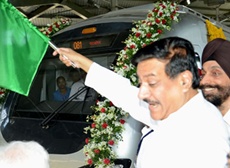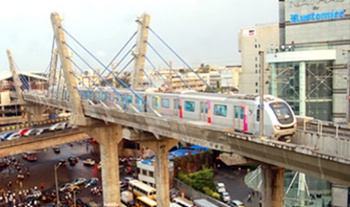Mumbai’s monorail project finally starts operating
01 Feb 2014
 India's first monorail service started operating in Mumbai today over an 8.9-km stretch between Chembur in the east and Wadala in the south in the central-eastern suburbs.
India's first monorail service started operating in Mumbai today over an 8.9-km stretch between Chembur in the east and Wadala in the south in the central-eastern suburbs.
The service was flagged off by Maharashtra chief minister Prithviraj Chavan this afternoon.
While commercial operations will begin tomorrow, there will not be a fixed schedule for the services, which will be decided later as per traffic flow.
The fares have been fixed between Rs5 and Rs11 for the first phase of operations.
There will no monthly passes, but there will be a system of smart cards.
In the first phase, six trains will operate while another 10 will be added in the second phase.
All coaches are air-conditioned and each train has a capacity to carry 560 passengers.
The services will operate with four coaches having a combined carrying capacity of 2,300 passengers at intervals of 15 minutes.
The monorail will reduce travel time between Wadala and Chembur by almost half - from 40 minutes at present to nearly 21 minutes.
The Rs3,000-crore monorail project is being implemented in two phases. The first phase comprises the 8.9-km long Wadala-Chembur section, while in the second phase the services will be extended to Sant Gadge Maharaj Chowk (Jacob Circle) in South Mumbai.
When the entire monorail project is completed, it will be 20 km long and connect Jacob Circle in south Mumbai to Chembur in eastern Mumbai.
The project has been executed by a consortium of engineering major Larsen and Toubro Ltd (L&T) and Malaysian firm Scomi Engineering.
 MMRDA, which owns and operates the project, has already spent Rs1,900 crore of the Rs3,000 crore allocated for the project. Civil work on the second phase of the project has also been completed.
MMRDA, which owns and operates the project, has already spent Rs1,900 crore of the Rs3,000 crore allocated for the project. Civil work on the second phase of the project has also been completed.
Construction of the monorail, which began in 2009, is running almost two years behind schedule.
At its fastest, the monorail will run at 80 km per hour, while the average speed is expected to be 65 km per hour.


















